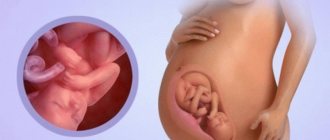Very often, such a wonderful period of waiting for a baby is overshadowed by the appearance of various dyspeptic disorders, causing in some cases periodic or constant discomfort, and in some cases - serious disorders accompanied by pain in the epigastric region. Diseases of the upper gastrointestinal tract (GIT) in pregnant women are characterized by a wide variety of symptoms and, in most cases, the absence of a clear clinical picture.
The last factor is associated with physiological changes occurring in a woman’s body:
- displacement of the stomach or intestines due to fetal growth;
- hormonal changes;
- sudden changes in taste preferences.
Gastroscopy during pregnancy is undoubtedly the most informative diagnostic technique, the implementation of which, however, is quite difficult for a woman. In this regard, gastroscopy should be used for diagnosis only for special indications or in the absence of any effect from previous treatment.
Recommendation 1: stop taking medications
The most important rule for women in the first trimester of pregnancy is to avoid taking medications. The medications you took before pregnancy cannot be used in the first trimester of gestation.
In the early stages of pregnancy, the formation of fetal organs occurs, and any drug can negatively affect this process. Therefore, before you swallow a tablet, powder or syrup, think carefully and be sure to consult with your obstetrician-gynecologist. If you have any chronic disease that requires medication, you should also consult a specialist.
Indications
The answer to a fairly common question, is it possible to do gastroscopy during pregnancy, is some limitation of the indications for this type of diagnosis. In a normal situation, the following regularly occurring dyspeptic phenomena that require clarification of the preliminary diagnosis may serve as indications:
- nausea or vomiting;
- heartburn;
- belching;
- constipation;
- pain in the upper abdomen.
During pregnancy, all these phenomena are considered to be subjective and treatment is carried out based on complaints and symptoms. The decision to prescribe gastroscopy is made based on an assessment of the body’s condition, based on the following clinical manifestations:
- intensity of pain symptoms;
- frequency of exacerbations;
- pain in the upper abdomen due to eating;
- pain on palpation of the abdominal area above the navel or on the right;
- increase or disappearance of pain after taking alkaline drugs;
- increase or disappearance of pain after vomiting;
- the presence of blood in vomit or feces.
Due to the increased emotionality that characterizes a pregnant woman, the gastroscopy procedure is quite difficult to tolerate. Increased nausea, for example, with toxicosis, can play a certain role in the difficulty of inserting a gastroscope. Severe spasms caused by gagging can inadvertently cause damage to the mucous membrane. But since an alternative to gastroscopy can only be an X-ray examination, which is unacceptable during pregnancy due to the ability to have a negative effect on the fetus, in cases that are obvious from a diagnostic point of view, it is advisable to limit ourselves to symptomatic treatment with regular testing for occult blood.
Thus, the answer to the question whether pregnant women can have gastroscopy depends solely on a competent assessment of the course of the disease and the woman’s condition. In the latter case, the following factors are assessed:
- is there toxicosis?
- age of the pregnant woman;
- secretory function of the stomach;
- uterine tone.
Important! If bleeding from the upper gastrointestinal tract, tumor or stenosis of the upper stomach is suspected, gastroscopy is prescribed at any stage of pregnancy.
A complete blood count may also indicate the presence of occult bleeding.
Recommendation 2: Avoid strenuous physical activity
Is it possible to play sports in the first trimester? Not only is it possible, but it is necessary! Exercising during pregnancy is the key to excellent mood, good physical shape, normal weight, absence of constipation and swelling. In addition, sports allows you to prepare your body for the upcoming birth.
If before pregnancy you did Pilates, yoga, or swimming, then in the first trimester of gestation you don’t have to give up your favorite activities. But it’s not worth learning new sports. Unusual exercises and loads for the body can negatively affect the course of pregnancy.
Heavy physical activity is prohibited in both early and late stages of pregnancy. For example, you cannot jump into water from a tower, ride horses, or go rock climbing. If you were previously into running, then during pregnancy it is better to replace running with brisk walking.
Recommendations for pregnant women
Women are interested in whether it is possible to do gastroscopy while expecting a baby. Gastroenterologists assure that the procedure itself is safe. However, like any other medical intervention, it is stressful for the body. A pregnant woman is sensitive to all changes that occur. The doctor must explain to the expectant mother the need for FGDS. If the benefit for the mother is obvious, then the procedure must be done as soon as possible.
Many women are afraid of discomfort during FGS. Discomfort is usually associated with insertion of the device into the throat. The probe irritates the mucous membranes. The gag reflex is often provoked. The solution to the problem is the use of a local anesthetic. Doctors prefer lidocaine in spray form. This drug works on the principle of freezing. The effect occurs within a few minutes. The sensitivity of the mucous membranes decreases, the patient does not experience discomfort. Lidocaine is safe for both the expectant mother and her child.
An alternative to such pain relief is immersion in medicated sleep. In this case, unpleasant sensations are completely eliminated. Before performing a procedure using this technology, an experienced anesthesiologist must assess the health status of the pregnant woman.
Recommendation 3: Avoid long flights
Perhaps in the 1st trimester of pregnancy you will want to go on vacation to distant countries. For example, to Cuba, Sri Lanka, Tanzania. Vacations in exotic countries are of course good, but your health and the safety of your unborn baby should come first!
During a flight, there is a very large pressure drop, and how your body will bear this load is anyone’s guess. It is likely that everything will go fine, but some problems are possible:
- exacerbation of toxicosis;
- frequent urge to urinate;
- increased fatigue;
- problems with the digestive system;
- dizziness.
In addition, during a long flight you will be constantly sitting. And prolonged sitting can lead to lymphostasis - swelling of the soft tissues. In this regard, it is quite reasonable to replace long flights with shorter travel routes.
Before your flight, be sure to go to an appointment with an obstetrician-gynecologist, who will assess your condition and accurately answer the question: can you fly or not. If you have certain health problems, flying is contraindicated for pregnant women. For example, air travel is prohibited if you have severe anemia.
When going on holiday abroad, do not forget that in many countries in Europe and Asia there is a risk of contracting measles and rubella. And if you did not have measles or rubella as a child or did not complete the full course of vaccination against them, then if you become infected, you will face serious troubles. For example, infection with rubella in the first trimester increases the risk of miscarriage by 4 times.
What is gastroscopy
Gastroscopy is a diagnostic procedure during which, using a probe inserted into the stomach cavity, equipped with a fiber-optic system, the mucous surface of the entire upper gastrointestinal tract is examined. At the same time, a modern probe (gastroscope), having a small thickness (only 0.53–1.3 cm), is capable of not only illuminating and transmitting an image of the inspected surface to a video monitor, but also performing various manipulations, including:
- collecting a sample of gastric mucus for analysis;
- collection of a tissue fragment for histological analysis (biopsy);
- performing minor surgical procedures (for example, polyp removal).
Depending on the scope of the study, gastroscopy may include not only examination of the esophagus and stomach, but also the duodenum. The use of modern equipment allows us to minimize all possible risks of injury during diagnostics, however, the small probability of the following complications cannot be completely excluded:
- damage to the mucosa;
- infection;
- perforation of the wall of the stomach or esophagus.
Important! Gastroscopy should not be done during pregnancy if the previous examination was carried out less than 2 years ago and no serious pathologies were found.
Examination of the stomach cavity using a gastroscope
Recommendation 4: exclude spicy, salty, raw foods from your diet
The importance of proper nutrition in early gestation cannot be overemphasized. The growth and development of your unborn baby largely depends on how you eat. And there are a number of foods that pregnant women should avoid. These include:
- Spicy, salty, smoked foods that put a lot of stress on the liver and kidneys. During pregnancy, these organs already have a hard time. The liver experiences double load due to hormonal changes. In the kidneys in the first trimester, blood flow increases and glomerular filtration increases. Therefore, you should not additionally burden the liver and kidneys with poor nutrition.
- Blue cheese, raw eggs, meat; fish. These products may contain pathogenic bacteria. For the same reason, you should not consume raw milk. Even if you buy milk from a trusted store, it is better to boil it before use.
- Carbonated drinks, which negatively affect the functioning of the intestines, kidneys, and gallbladder, cause bloating and stool upset.
- Coffee. The allowed limit is one cup of coffee per day. Drinking more coffee can increase the muscle tone of the uterus and cause miscarriage.
- Alcohol. Drinking alcohol during pregnancy leads to oxygen starvation of the fetus, delaying its growth and development. Just 3-4 small doses of alcohol can cause alcohol syndrome in the fetus, leading to serious mental and physical abnormalities.
Preparation
In order to minimize the likelihood of negative consequences of gastroscopy and make the process of examining the gastrointestinal tract as easy as possible, a little preparation for the procedure is required. It consists of completely refusing to eat 8–10 hours before the procedure and refusing to drink liquids 2–3 hours before gastroscopy. It is also advisable to exclude from the diet foods that stimulate the secretion of gastric juice for 2-3 days:
- spicy;
- salty;
- pickled;
- smoked.
A completely empty stomach will not only reduce the intensity of vomiting, but will also eliminate the possibility of liquid vomit getting into the respiratory tract.
Recommendation 5: Do not wear tight clothes and shoes
In the 1st trimester of pregnancy, a woman’s silhouette changes slightly. Because of this, many pregnant women continue to wear tight-fitting clothes to highlight their figure. However, even in the early stages of pregnancy, it is better to choose loose clothing that does not compress soft tissues, the abdominal area, and mammary glands. Wearing tight clothes can impair blood circulation, lead to lymph stagnation, cause fatigue, and increase the unpleasant symptoms of toxicosis.
What kind of shoes should pregnant women wear? Choose comfortable shoes with solid soles. During pregnancy, the center of gravity gradually changes, and when wearing shoes with heels, the load on the lumbosacral region increases.
If we talk about the cold season, it is better to replace shoes and boots that are very tight on the calf muscles or feet with looser shoes. As with clothing, this will help avoid poor circulation and lymph stagnation.
Technique
Fibrogastroscopy is carried out using a special device - an endoscope (probe). The probe is represented by an optical fiber structure. There is a channel inside for administering medications or surgical instruments. At the end of the tube there is a light bulb for illuminating the mucous membrane, and a microvideo camera for reproducing the picture on the monitor screen. The entire process is recorded on an information medium.
Endoscope
The patient is placed on her left side on a couch in the endoscopy room. The pharyngeal ring is irrigated with a local anesthetic; lidocaine is often used. It is worth noting that if the endoscope has a small diameter (up to 6 mm), then the local anesthetic may not be used (if the gag reflex is weak). They are asked to clamp a sterile plastic mouthpiece between their teeth; it prevents the reflexive closing of the mouth and biting of the endoscope.
The woman performs a swallowing movement, at which point the device moves into the esophagus. The doctor blows in a small volume of air to straighten the folded structure of the mucous membrane and accurately visualize the pathological process.
Before the procedure, the pregnant woman should calm down and relax. Sometimes a close relative is allowed to be present for moral support.
The duration of diagnostic endoscopy is 5-8 minutes, therapeutic endoscopy is up to 20 minutes.
Recommendation 6: avoid hypothermia and overheating of the body
If before pregnancy you liked to take a steam bath or, conversely, plunge into an ice hole, then during pregnancy you need to reconsider your habits. Overheating and hypothermia are dangerous for the fetus, especially in the first trimester of gestation.
Hypothermia impairs blood circulation, which can cause fetal hypoxia. Also, do not forget that during pregnancy, immunity decreases, which means the risk of colds increases.
Overheating of the body in the early stages of pregnancy negatively affects the formation of the fetus and increases the risk of miscarriage. Therefore, in the first trimester of gestation it is better to avoid baths and saunas. In the second and third trimester, if there are no contraindications, you can visit the sauna and bathhouse.
How to prepare for fibrogastroduodenoscopy?
During pregnancy, physical and mental preparation is important. A positive attitude will help the expectant mother calm down. In the absence of stress, the procedure will go smoothly, which will eliminate the possibility of complications and make the examination more accurate.
The process of inserting a probe gives a woman the greatest anxiety. The tube irritates the mucous membrane, which causes a gag reflex. This is why the throat is treated with a local anesthetic, usually lidocaine. The anesthetic spray will eliminate discomfort and, due to its local action, will not harm the baby.
Physical training:
- do not eat 8 hours before FGDS;
- do not drink immediately before the procedure;
- Do not take medications containing ethyl alcohol.
Recommendation 7: Do not use hair and nail dyes with toxic substances
Of course, even during the period of bearing a child, every woman wants to remain beautiful. Therefore, pregnant women often have a question: is it possible to dye your hair and get a manicure during pregnancy?
You can dye your hair during pregnancy, but you need to choose gentle organic dyes made from natural ingredients. Inorganic paints contain ammonia and other harmful substances that can cause allergies in a pregnant woman and increase symptoms of toxicosis.
The situation with manicure is more complicated. A manicure always begins with removing old nail polish. Remove varnish with acetone and other substances that have a very strong odor. This can cause an allergic reaction in you, even if you were not allergic to acetone before pregnancy. The thing is that during pregnancy, immunity decreases, which means the likelihood of allergic reactions increases. If you still decide to go to the salon for a manicure, then ask the master for a mask that will protect the respiratory tract from harmful substances.
For manicure, you should also choose gentle varnishes that do not contain toxic substances - phosphoric acids, acetone alcohols, formaldehyde.
Preparation for the procedure
FGDS is considered to be a safe procedure. Carrying a child is not a contraindication to the procedure. However, a woman must carefully prepare for manipulation.
Gastroenterologists recommend conducting the study in the morning. Eating is prohibited 6–8 hours before the intervention. Drinking any liquids is also not allowed. The stomach should be empty. This measure will ensure the reliability of the results. A specialist will use a device to examine all the internal walls of the organ.
Smoking is also prohibited before FGDS. This bad habit should be avoided when carrying a child. Tobacco smoke and tar, entering the esophagus, settle on the mucous membranes. This may distort the results of the study.
Recommendation 8: Accept your pregnancy and your new role as “I am a mother”
In the first trimester of pregnancy, hormonal changes occur in the female body, which affects the functioning of the nervous system. In this regard, a pregnant woman may experience conditions and emotions such as tearfulness, anxiety, and excessive sensitivity. And some pregnant women even feel guilty before others for their whims over trifles, frequent emotional breakdowns.
Feelings of guilt are a negative attitude that must be gotten rid of. After all, such an emotion will cause you psychological discomfort.
Irritability in the early stages of pregnancy is nothing more than an attempt by the female psyche to fully realize and accept the fact of motherhood. And the sooner you accept your pregnancy and your new role as a mother, the sooner your calmness, good mood will return, and you will stop feeling guilty before others.
When is it urgent to “swallow the light bulb”?
07.06.2021
Samara doctors tell us when you urgently need to “swallow a light bulb”
Patients are no less afraid of endoscopic examination, in particular EGDS, than of going to the dentist.
In recent years, the number of diseases of the digestive system has increased markedly, and pathology of the upper gastrointestinal tract has become especially common - astroesophageal reflux disease, gastritis, duodenitis. Moreover, among all diseases of the esophagus, cancer accounts for 80%! The reason is the lack of timely examination and proper treatment.
Not wanting to undergo an unpleasant procedure, people delay the examination until the last minute. Pain or a feeling of heaviness in the stomach, belching, heartburn after eating, a white coating on the tongue, nausea, vomiting, rumbling and bloating, loss of appetite, weight loss - these are just some of the complaints with which patients turn to doctors.
“Yesterday and today I had strange discomfort when swallowing throughout the day. This is not a sore throat, like with a sore throat or sore throat. This is something completely different. How dangerous is this?
“I was taken to the hospital by ambulance: a stone in the ureter, acute pyelonephritis. I was injected with antibiotics, and then I took medications for the gastrointestinal tract. Nevertheless, my stomach ached, and now my intestines. Sometimes the temperature rises to 37-37.2, what do I have? And is it necessary to do FGS?”
“I have been having constant abdominal pain for a month now. They began after an exacerbation of chronic pancreatitis. I saw a gastroenterologist and was prescribed medications, but there was no improvement. Will you have to “swallow a light bulb?”
How to undergo the examination comfortably?
Many people prefer to limit themselves to medications prescribed by a doctor and ignore detailed research. “What if I suffocate during the procedure?”, “I’m afraid that I will vomit right in front of the doctor,” patients share their fears. However, their worries are in vain.
“First, you need to tune in and prepare,” advises Gellia Bilalova, an endoscopist at the Reaviz multidisciplinary clinic. – For examination of the esophagus, stomach and duodenum, you must come strictly on an empty stomach: 6 hours before the examination, do not eat, drink, smoke, or chew gum. Secondly, remember that the examination is absolutely painless, although a little unpleasant. In order to feel better, you need to breathe properly during the examination. The doctor will tell you and show you how. Thirdly, during the examination, air is blown into the stomach so that the doctor can thoroughly examine the mucous membranes. Therefore, air “burping” may occur during the process. This is not something to be afraid of, this is how it should be. The main thing is, under no circumstances try to remove the device yourself.”
Without fear and pain
The Reaviz multidisciplinary clinic uses expert-class equipment with advanced image transmission technologies. The narrow diameter of the inserted tube - 9 mm - and the correct technique for performing manipulations significantly reduce discomfort and unpleasant sensations during the examination. In this case, the patient is under constant supervision of a doctor and nurse.
More and more patients prefer diagnostics under sedation, because for them it means the absence of fear and discomfort during the examination. And it’s easier for the doctor to concentrate.
Endoscopy is a modern standard in diagnostics
Many diseases of the gastrointestinal tract cannot be diagnosed in a laboratory or detected by ultrasound; endoscopic examination is required. Here are the parts of the gastrointestinal tract that doctors examine using this diagnostic:
- esophagus (esophagoscopy)
- stomach (gastroscopy)
- duodenum (duodenoscopy)
- colon (colonoscopy)
Colonoscopy is an examination of the large intestine, which includes examination of the rectum, sigmoid and other parts of the colon, and, if necessary, part of the ileum (small) intestine. Doctors of both therapeutic and surgical profiles refer for such a study, since endoscopy is the “gold standard” for diagnosing diseases of the colon.
During an endoscopy, the doctor can determine the acidity of gastric juice, conduct a test for Helicobacter pylori infection, and, if necessary, take a biopsy. In some cases, the polyp formation can be removed during the study.
Alarming symptoms – an urgent reason for endoscopy
With endoscopy it is easy to diagnose diseases of the esophagus, stomach and duodenum, identify complications, monitor the effectiveness of treatment and distinguish these diseases from others with similar symptoms.
“What symptoms require endoscopy? If you experience difficulty swallowing with a feeling of a lump in the throat, increased salivation, feel food passing through the esophagus, and at the same time experience pain behind the sternum, says Gellia Bilalova, endoscopist at the Reaviz clinic. — Often, such symptoms occur in psycho-emotional stressful situations, and most often in women. But the above symptoms may signal, for example, inflammation of the esophageal mucosa or the occurrence of malignant neoplasms.”
As the doctor notes, similar manifestations may be associated with diseases of other organs and systems, for example, diabetes mellitus, peptic ulcer disease, chronic cholecystitis. But they are also the primary symptoms of esophageal cancer. Its secondary symptoms are coughing attacks, slow pulse, vomiting, shortness of breath. They may be accompanied by a sharp loss of body weight, weakness, and loss of appetite.
Alas, our fears and indecisiveness often prevent us from contacting a competent specialist on time and undergoing an examination. Don't wait until it gets really bad, doctors warn. High-quality and timely diagnosis will allow timely identification of the disease and prescribing effective treatment. Or confirm that everything is fine with your health!
Source ProGorod
Return to articles









